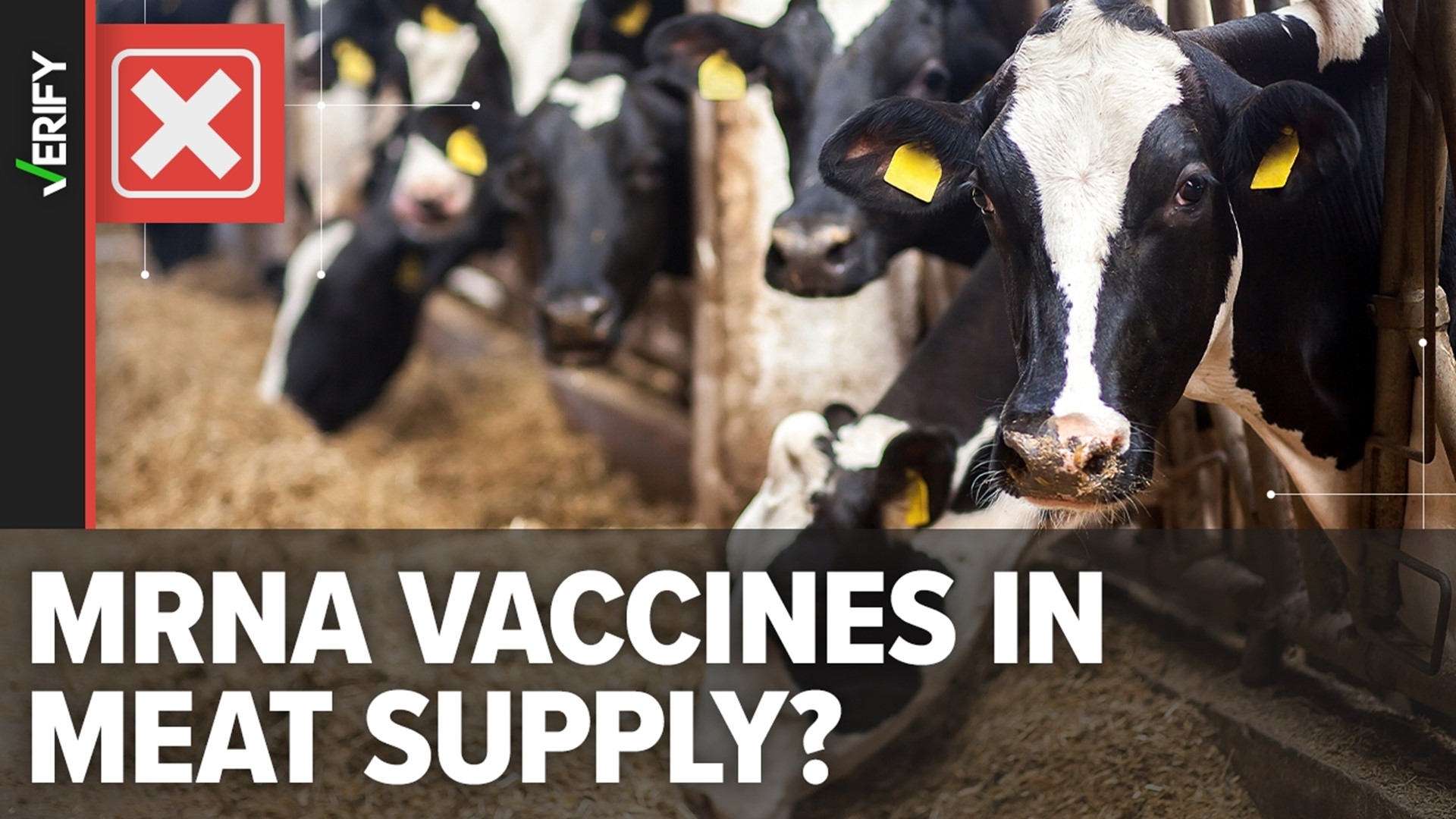Messenger RNA (mRNA) is genetic material that tells your body how to make proteins. Two of the most widely used COVID-19 vaccines — produced by Pfizer and Moderna — are made with mRNA.
mRNA vaccines use mRNA created in a laboratory to teach our cells how to make a protein that triggers an immune response inside our bodies, according to the Centers for Disease Control and Prevention. This immune response, which produces antibodies, is what helps protect us from getting sick from that germ in the future, the CDC says on its website.
On Oct. 1, an online article claimed the U.S. food supply will soon be contaminated with mRNA vaccine-tainted meat. VERIFY reader Nena asked in an email if that’s true.
THE QUESTION
Are mRNA vaccines being added to the U.S. food supply through “vaccine-tainted meat”?
THE SOURCES
- USDA Animal and Plant Health Inspection Service
- National Cattlemen’s Beef Association (NCBA)
- Kyle Flanigan, Ph.D., CEO and co-founder of US Specialty Formulations
- Mollie Newton, D.V.M., veterinarian and founder of PetMeTwice
- Article by David Verhoeven, Ph.D., assistant professor of vet microbiology and preventive medicine at Iowa State University
- Article published in Viruses, a peer-reviewed, open-access journal of virology by MDPI
THE ANSWER
No, mRNA vaccines are not being added to the U.S. food supply through “vaccine-tainted meat.”
WHAT WE FOUND
mRNA vaccines are not being added to the U.S. food supply through “vaccine-tainted meat,” according to all of our sources. These false claims have been circulating online since January 2023.
“There is no evidence of mRNA vaccine usage on livestock in the USA,” said Kyle Flanigan, CEO and co-founder of US Specialty Formulations, a pharmaceutical manufacturing firm based in Pennsylvania.
The Department of Agriculture’s Animal and Plant Health Inspection Service (APHIS) is the federal agency charged with licensing and regulating animal vaccines. As of Oct. 20, 2023, there are no mRNA vaccines being used in cattle in the U.S., a USDA spokesperson told VERIFY. A spokesperson for the National Cattlemen’s Beef Association (NCBA) also told us there are currently no mRNA vaccines licensed for use in beef cattle in the U.S. or worldwide.
Additionally, there are no licensed mRNA vaccines for COVID-19 for animals in the U.S. USDA’s APHIS also has not approved nor does it have any vaccines under clinical trial to vaccinate livestock for COVID-19.
The USDA spokesperson did note that there are four licensed mRNA vaccines for pigs, cats, and dogs, but added that “those vaccines have numerous biological differences compared to the COVID-19 mRNA vaccines used in humans.”
Researchers have been studying and working with mRNA vaccines for decades, according to the CDC. In fact, the public health agency says that mRNA vaccines have been studied before for flu, Zika, rabies and cytomegalovirus (CMV). Beyond vaccines, cancer research has also used mRNA to trigger the immune system to target specific cancer cells.
The classification of mRNA vaccines includes two major types: non-amplifying RNA vaccine and self-amplifying RNA (saRNA) vaccine. Merck’s Sequivity is currently the only saRNA vaccine licensed for use in animals in the U.S., according to David Verhoeven, an assistant professor of vet microbiology and preventive medicine at Iowa State University. Sequivity is available by prescription to protect against swine flu in pigs.
In April, Jason Menke, a National Pork Board spokesperson, told the Associated Press that “pork from vaccinated animals is safe to consume as vaccines are not present when pigs enter the food supply.”
“Vaccines are critical to preserving animal health and well-being, keeping the food supply safe, and protect U.S. livestock from emerging and foreign diseases,” Menke said.
USDA food safety regulations prohibit the slaughter of farm animals following vaccination earlier than the approved period, which is known as the “withdrawal time.”
“Concerning animal vaccination, ‘withdrawal time’ designates the duration following the vaccination of an animal during which their products, such as meat, milk or eggs, are not recommended for human consumption,” said veterinarian Mollie Newton.
“This practice is implemented to guarantee the absence of residual vaccine components or potential side effects that might infiltrate the human food chain,” Newton added.
Some of the online claims suggest that mRNA vaccines could somehow transfer from animals to humans when consumed. But Flanigan and Newton both said there is no evidence to suggest that mRNA vaccines can be transferred from animals to humans through food.
“Consuming meat from vaccinated animals does not introduce an mRNA vaccine into one's body. mRNA vaccines are administered via injection, and the digestion process in the human body is highly effective at breaking down and processing foreign substances,” Newton told VERIFY.
Verhoeven also said in May that “it’s all but impossible for [these vaccines] to end up in your food.”
Source of Misinformation
VERIFY found that online posts claiming mRNA vaccines are being added to the U.S. food supply through livestock began circulating after Robert Malone, a principal founder of mRNA technology who is known to spread COVID-19 misinformation, published a Substack article titled “mRNA Vaccines in Livestock and Companion Animals are here now,” in January 2023.
Malone was banned from Twitter for violating the platform’s COVID-19 misinformation policies in early 2022. Many of his claims regarding mRNA vaccines have been widely disputed throughout the coronavirus pandemic.
On April 5, 2023, the NCBA addressed the misinformation circulating online about mRNA vaccines in livestock in a statement posted to their website.
“There are no current mRNA vaccines licensed for use in beef cattle in the United States. Cattle farmers and ranchers do vaccinate cattle to treat and prevent many diseases, but presently none of these vaccines include mRNA technology,” the NCBA said.
Other fact-checking organizations, including the Associated Press, have also debunked these claims.
The Associated Press contributed to this report.

